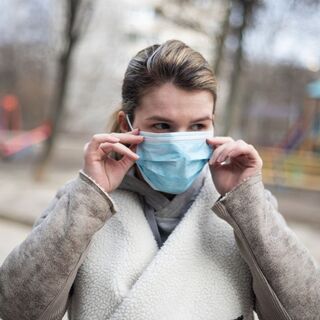Health
Community Mental Health and Masking Guidelines
Tools for navigating the new CDC guidelines regarding mask-wearing.
Posted May 19, 2021 Reviewed by Jessica Schrader
Key points
- Social contracts express the general will of a group, reflect their interests, and provide a basis for community behavior.
- Social contracting regarding mask-wearing is impacted by the new CDC guidelines, leading to heightened tensions.
- Being honest about choices, leading with empathy, and tending to personal trauma can help with navigating this time.

Life during COVID-19 has been complicated. The co-occurring social and political conflict, unrest, and racial reckoning made it even more so. In America, we’ve rarely been so needful of social contracts to get us safely through traumatic times while, at the same time, so divided in our ideology around physical safety and the reliability of science.
The Oxford dictionary defines social contracts as “implicit agreements among the members of a society to cooperate for social benefits, for example by sacrificing some individual freedom for state protection.” Social contracts are built upon trust and the idea that everyone benefits when individual community members experience a sense of safety. They express the general will of a people group, reflect their general communal interests, and provide a behavioral and ideological framework for the well-being of the entire community. It’s not a stretch to say that Americans have been universally unable to commit to such contracts during the last 15 months. The response to the newest CDC guidelines regarding mask-wearing illuminates this reality with the new guidelines assuming a level of responsibility to community that is difficult for many to trust.
As the U.S. responds to the new recommendations, uncertainty regarding who is currently maskless because of vaccination status and who is not wearing a mask because of personal preference, leads many to feel as though they can’t get access to the kind of information that will help them make informed decisions. Nowhere is this more evident and understandable than in communities of people who have either had COVID-19 and survived, lost loved ones to the virus, are under age 12 or care for children under age 12 (and cannot be vaccinated), or who are medically unable to receive the vaccine. It’s understandable that these communities would have strong reactions to the combination of not knowing who is vaccinated and the invitation for those who are to universally remove their masks. In an already divided state, distrust, anger, and irritation are being refueled.
Without social contracts that ensure communal physical and mental health in place, people continue to find themselves in situations that bring the conflicts, stresses, and, for some, traumas, of the past year front and center. When this happens, people are left facing difficult situations while, at the same time, feeling the full weight of emotions that the body has stored. Given the many small and large traumas that people have experienced throughout the course of the pandemic, these stored emotional responses (traumas) are piqued when social reminders present themselves, leaving the person feeling emotionally dysregulated and reactive. Without strategies for navigating these situations, people risk personal unrest at best and mental health concerns at worst.
As we work to understand and implement the new guidelines, may we also do the hard work of entering into social contracts that ensure the mental (and physical) health of more than just ourselves. Given the polarization, politicization, and widespread attendance to personal preferences over communal mental health and safety, these prompts can serve as tools in making decisions about how to engage our own decision-making process, as well as that of others, at this moment in time.
1. Be honest. When asked about your vaccination status, tell the truth without defensiveness. Others need to be able to make choices about their interaction and contact with you with full access to reality.
2. Pursue empathy. It’s easy to believe that your experience over the last 15 months matches that of the rest of the world. That, however, isn’t the case. It’s important to remember that a bulk of Americans have been personally touched in profound ways by COVID-19. 587,166 people have died of the virus in the U.S., leaving families, friends, and communities with complicated and traumatic grief. 32,994,152 Americans have had the virus but survived. Some of these, however, live with long-term, life-altering symptoms that affect them and those in their relational spheres. There are also places and situations wherein the new guidelines might make very reasonable sense (situations requiring proof of vaccination, locations that have experienced a low number of cases, high vaccine rates, etc.). Being aware of, bearing witness to, and being empathic regarding more than your own experience of the pandemic will help to inform your choices and make you a better neighbor.
3. Consider consent above all else. Regardless of vaccination status, ask those you interact with if they are comfortable with maskless encounters, physical touch, and closer than 6-foot contact. The internal distress as well as the interpersonal habits that resulted from quarantine are very real and won’t automatically disappear. It’s important to consider what feels emotionally and physically safe to you and to inquire about the same for others. Give yourself and those around you the time and space to reacquaint themselves with social contact in all its forms.
4. Consider the well-being of others at least as much as the well-being of yourself. Keeping in mind that this will not last forever, determine your willingness to act in ways that will advance the mental and physical health of others during this time of adjusting to new social realities and norms. If you choose not to be vaccinated and to go without a mask, decide how much you are willing to lose in the way of community to assert what you believe to be personal rights. If you’re willing to risk it, then at least remove yourself from it rather than creating disharmony in the community with angry outbursts.
5. Make a mental health self-care plan. It’s likely that you’ll experience plenty of big feelings as you re-enter socially connected spaces. Some of these will be related to reorienting your behaviors to a less shut-down world and others will be related to the situations you encounter with others. Regardless, it’s crucial to take stock, throughout each day, of your levels of emotional and physical dysregulation, taking steps to offer yourself comfort, soothing, and conflict resolution. Identify actions that help you find grounding and calm and schedule them into your week with consistency. This will benefit the whole world as well as yourself.


